

What am I to make of this, John? Terry Eagleton Paul Auster and J.
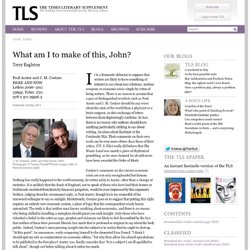
M. Coetzee HERE AND NOW Letters 2008–2011 256pp. Faber. £20. 978 0 571 29926 3 Published: 29 May 2013 J. I t is a Romantic delusion to suppose that writers are likely to have something of interest to say about race relations, nuclear weapons or economic crisis simply by virtue of being writers. Coetzee’s comments on the current economic crisis are not only wrongheaded but fatuous. Coetzee’s comments on the current economic crisis are not only wrongheaded but fatuous.
Arthur Rimbaud’s Brief Career. স্কুল অব কালচারাল টেক্সটস অ্যাণ্ড রেকর্ডস, যাদবপুর বিশ্ববিদ্যালয় No More Indiana Jones Warehouses - Do Your Job Better. By William Pannapacker In Raiders of the Lost Ark, Indiana Jones—perhaps the last heroic professor to appear in a major Hollywood film—survives a series of adventures involving spiders, snakes, treacherous colleagues, and countless Nazis who are determined to recover the ark of the covenant for their Führer.

Apparently the ark has mystical powers: If you open it with the wrong intentions, it will melt your face or explode your head. Ultimately, Jones recovers the ark: He really delivers on his grant. But the great artifact is not displayed in a museum or used in the war effort; instead it is enclosed in a packing crate and wheeled into a vast government warehouse, never to be seen again. That's what happens to the majority of undergraduate projects in the humanities.
Fortunately, we are living at a moment when our students can undertake a far wider range of learning experiences than was possible when the traditional research paper was the gold standard of scholarly production. The Idea of Order at Key West. Blood and Tragedy: The Caucasus in the Literary Imagination. At the beginning of “The Cossacks,” Leo Tolstoy’s early novel about imperial Russia’s military campaign in the Caucasus, the protagonist Olenin muses about the battles to come: “All his dreams about the future were connected with… Circassian maids, mountains, precipices, fearsome torrents and dangers.”
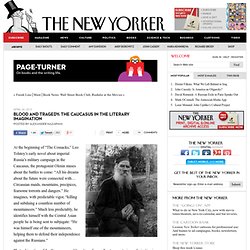
Speak, Memory by Oliver Sacks. In 1993, approaching my sixtieth birthday, I started to experience a curious phenomenon—the spontaneous, unsolicited rising of early memories into my mind, memories that had lain dormant for upward of fifty years.
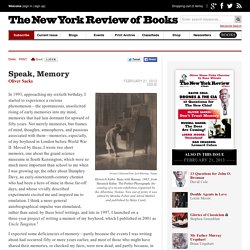
Not merely memories, but frames of mind, thoughts, atmospheres, and passions associated with them—memories, especially, of my boyhood in London before World War II. Remembering Dad. Julia Hobsbawm on the daunting intellect and tireless curiosity of her father Eric Hobsbawm, the historian and champion of the left who died last year ©Getty Images.
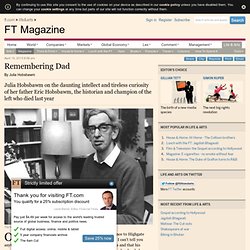
Beautiful Failures: Nabokov and Flaubert’s Débuts. Stanley Cavell and Literary Studies: Consequences of Skepticism. This is a volume of papers from a conference held at Harvard University in 2010 to honor the American philosopher Stanley Cavell (b. 1926), and particularly to celebrate the publication of his autobiographical fragments, Little Did I Know (Stanford University Press, 2010).
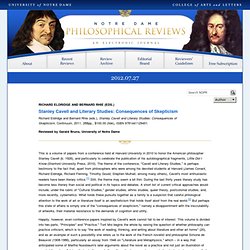
The theme of the conference, "Cavell and Literary Studies," is perhaps testimony to the fact that, apart from philosophers who were among his devoted students at Harvard (James Conant, Richard Eldridge, Richard Fleming, Timothy Gould, Stephen Mulhall, among many others), Cavell's most enthusiastic readers have been literary critics.[1] Still, the theme may seem a bit thin. During the last thirty years literary study has become less literary than social and political in its topics and debates. A short list of current critical approaches would include, under the rubric of "Cultural Studies," gender studies, ethnic studies, queer theory, postcolonial studies, and, more recently, cybernetics.
"All I wanted was a moment alone, to sit and weep" All I wanted was a moment alone, to sit and weep Legendary writer and poet Gulzar meets a young Pakistani at his home in Mumbai and talks about India Pakistan relations, his relationship with Ahmed Nadeem Qasmi, and his recent visit to his hometown, DinaBy Sehyr Mirza "We had never met but not a single day in those 14 years passed without a telephonic interaction with him.

I am still in touch with his daughter, grandsons and granddaughters. Even before we met, our relationship was like that of a family. Aaron Bady. In the heterogeneous melting pot of immigrants and ethnic diversity that was the United States in the twentieth century, it made a particular kind of sense to talk about the ‘Great American Novel’.
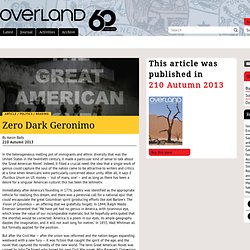
Indeed, it filled a crucial need: the idea that a single work of genius could capture the soul of the nation came to be attractive to writers and critics at a time when Americans were particularly concerned about unity. After all, it says E Pluribus Unum on US money – ‘out of many, one’ – and as long as there has been a desire for a singular ‘American culture’, this has been the leitmotiv. Immediately after America’s founding in 1776, poetry was identified as the appropriate vehicle for realising this dream, and there was a perennial call for a national epic that could encapsulate the great Columbian spirit (producing efforts like Joel Barlow’s The Vision of Columbus – an offering that we gratefully forget).
A Reader's War. Trevor Quirk: Flesh and Statue (David Foster Wallace) Both Flesh and Not David Foster Wallace Little, Brown, and Company, $26.99 (cloth) Every Love Story Is a Ghost Story D.T.
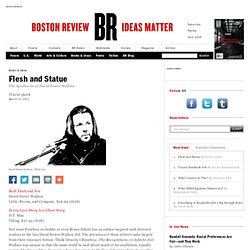
Max Viking, $27.95 (cloth) Not since Pynchon or Gaddis or even Bruno Schulz has an author inspired such devoted readers as the late David Foster Wallace did. The attraction of these writers came largely from their visionary fiction.
When I Stop Believing in Fiction. Like a late victorian clergyman sweating in the dark over his Doubts, I have moments when my faith in fiction falters and then comes to the edge of collapse.

I find myself asking, “Am I really a believer?” And then, “Was I ever?” Lin Burrow reviews ‘The Complete Works of John Milton. Vol. VIII’ edited by John Hale and J. Donald Cullington, ‘Young Milton’ edited by Edward Jones and ‘The Complete Works of John Milton. Vol. III’ edited by Barbara Lewalski and Estelle Haan · LRB 7 Mar. The quatercentenary of Milton’s birth was in 2008. The celebratory shenanigans – the conferences, public lectures, biographies and privy pieces of self-promotion that in our wicked age accompany all major anniversaries – are over. But one key question remains unanswered. How is it possible to like Milton? There is certainly a great deal to dislike. Most people would think of him as an overlearned poet who combines labyrinthine syntax with a wide range of moral and intellectual vices. Miltonophiles also have to overcome his regrettable tendency to present himself to the world as a prig. Alternate Versions of Being Human: 'The World of Persian Literary Humanism'
Hilary Mantel · Royal Bodies · LRB 21 February 2013. Last summer at the festival in Hay-on-Wye, I was asked to name a famous person and choose a book to give them. Elif Batuman reviews ‘The Programme Era’ by Mark McGurl · LRB 23 September 2010. Private Life Drama. Faces on an Icon (Countenances), Pavel Filonov, 1940 Soviet writer Andrei Platonov’s Happy Moscow finds the shortcomings of socialism not in its crushing the individual spirit but in its timidly preserving it.
Books reading and writing. Christopher Ricks · In theory · LRB 16 April 1981. Shakespeare Hatred: An Underground Literary Tradition. The lion's tail. Max Sebald's Writing Tips - Richard Skinner. Jay Griffiths - Forests of the mind. Eros is coursing through the forest. M.guardian.co.uk. Everything is Different Now, maybe, or not. The Theory Generation. If you studied the liberal arts in an American college anytime after 1980, you were likely exposed to what is universally called Theory. Chimamanda Adichie reviews ‘There Was a Country’ by Chinua Achebe · LRB 11 October 2012. Departures: The Novel, the Non-Place and the Airport. Poem of the Week: “The Review” Postcard from Kashmir. The Reader and Technology. Personism: A Manifesto. A mole-hill as high as Tenerife.